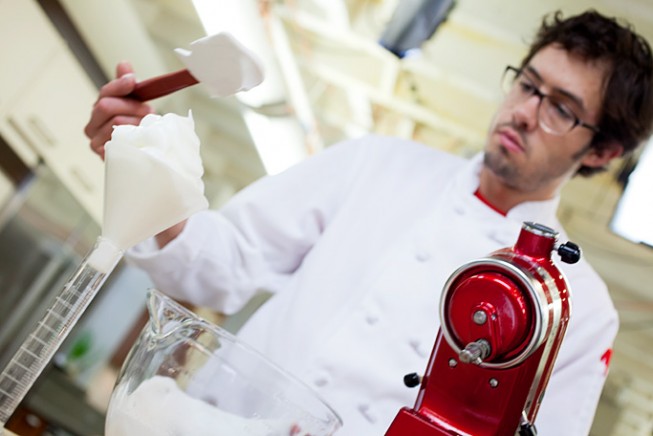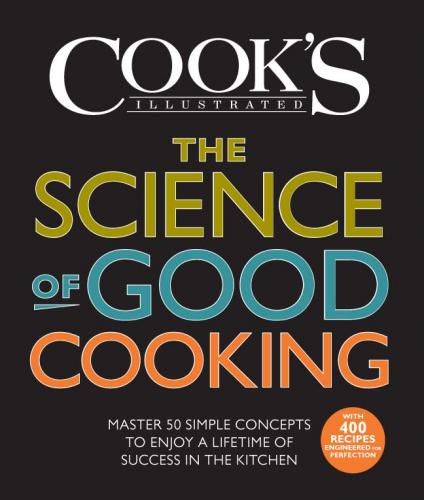By Amy Scheuerman, CGNE vice president
Dan Souza is an Associate Editor for Cook’s Illustrated Magazine. Dan was the Test Kitchen Experiment Editor for The Science of Good Cooking and will be a star in the upcoming season of America’s Test Kitchen TV. We interviewed Dan to learn more about The Science of Good Cooking, his experiments with David Pogue and the NOVA team for Can I Eat That and how he went from being an English teacher in Hungary to studying the science of the perfect Thanksgiving turkey.
Amy: How did you first get interested in cooking?
Dan: I was interested in cooking from a young age, which I think most people are who get into this world. I didn’t get interested in cooking professionally until I went and tried teaching English in Hungary and I was quite poor at it. And one of my adult students was the chef at the local restaurant – and this was a village of like 1500 people, so this is a restaurant in the truest sense of the term – but was more making really old school Hungarian food for large groups of people. I was looking for something I’d really enjoy and I started cooking there on the weekends and fell in love with it and thought it was the best thing ever. We’d get like whole sides of beef from like the father of the bride for a wedding dinner and turn it into beef stew and goulash and all these things. So I started paying way more attention to that and didn’t have to worry about the fact that I was horrible at teaching.
Amy: Did you just abandon the kids?
Dan: Ha! No I actually started working cooking more into the lessons, which made me like teaching more.
Amy: Where did you attend culinary school and get your cooking chops?
Dan: When I came back from Hungary, I’d gone to school for business and communications and wanted to do something with that. So I worked in advertising as a copywriter. During that time I kept thinking “I kinda want to cook,” but it took me two years or so to convince myself that I could go make salads for a living and it would be okay. I finally did that. I was doing some freelance ad work with Dante and I just asked them if I could cook for them on weekends. They threw me into it, I screwed up a ton, they let me keep doing it, amazingly. And eventually the chef said to me, “If you want to do this, you’re kinda old in the grand scheme of restaurant cooking, so you might want to go to culinary school soon.” So I went to the CIA in Hyde Park and got an Associates there.
Amy: Did your interest in cooking science lead you to ATK, or did ATK increase your interest in cooking science?
Dan: There were times in culinary school that I wanted to know more and I turned to Harold McGee’s On Food and Cooking, which I think is pretty common. I tried to look for answers on things and try to understand the whys. But I definitely came to science through food. I’m really a writer and a cook first. The science helped me to better understand the cooking. It really came to a head here [at America’s Test Kitchen] when I was really looking for ways to make recipes better or more functional.
Amy: What was the topic for the NOVA special?
Dan: Making the perfect turkey. We talked a lot about brining and salting. We did some stuffing. Talked about staling bread versus drying it out and what that does to the final texture. I know what I did was smash a lot of burgers with David Pogue to show the value of grinding your own meat.
Amy: When was it filmed?
Dan: We filmed in April.
Amy: So is it weird to be making a giant Thanksgiving feast in spring?
Dan: You know, it isn’t really for us, just because we work on a time table that’s so offset. We’re never really doing things at the right time, like holiday cookies in summer. I think that for most people it could be weird, but we’re very used to it at this point. Like grilling when you don’t want to be grilling so readers can do it in the summer. By the time Thanksgiving actually rolls around you don’t even want it because you’ve had it so many times.
Amy: What’s your favorite part of testing recipes and cooking techniques in the ATK kitchen?
Dan: We do two kinds of testing. One is more step-by-step. We always try this and then that and then that. The other is that we do some really out of the box stuff where we just see what happens. It’s those kinds of discoveries that I really like. And I like trying things that you read in Modernist Cuisine that’s kind of a chefy, high-end book, but then we tweak it in the kitchen so it’s something home cooks can use.
Amy: You were also very involved in the new Science of Good Cooking book, right?
Dan: Nods
Amy: What was your favorite experiment from that book?
Dan: There’s one that I really liked…discussing the effect of glutamic acid and glutamates on our sense of savory or umami and talking about these newly identified group of flavor boosters called free nucleotides and they work in synergy with each other.
So what we did was we got pure samples of MSG and free nucleotides and added them to water. We added MSG to one and free nucleotides to another and a combination of the two to another. And the water is remarkably savory, which is kind of weird because it’s water and it’s savory. The combination one there’s synergy there and it’s really noticeable and really cool. And if you look at cuisine this relationship is everywhere. And foods that are rich in glutamates and paired with foods that are rich in free nucleotides.
Amy: I’ve never heard of free nucleotides, can you give me an example?
Dan: If you look at Caesar salad. In caesar salad dressing you have anchovies, which have a lot of free nucleotides (and a little bit of glutamic acid), and then the Parmesan cheese has a lot of glutamates, so that combination together is really savory and good. If you look at even like a cheeseburger, the beef has a lot of free nucleotides and the cheese has glutamic acid which is another combination we love and you see that repeated over and over.
Amy: What experiment gave you results you really didn’t expect?
Dan: There’s some really surprising stuff in the book and when you first encounter it you’re like “whoa!” We had an experiment where we had four boneless, skinless chicken breasts and four different marinades. They were pretty standard: one was soy sauce based, one was red wine, one was garlic and parm and one was yogurt based. So we marinated them for 18 hours, which is a really long time for a marinade, but we wanted to make sure it had time to penetrate. Then we cooked them and carved off the outer 3 millimeters of all of them. We cut them into cubes and had people try them and people couldn’t tell the difference.
Amy: Everyone who buys a ticket to the screening of the NOVA special will receive a copy of the Science of Good Cooking. What is the one recipe you think everyone should make from the book?
Dan: It depends on if you have a sweet tooth or not but I feel like the Perfect Chocolate Chip Cookies are a must. They’re so good, they’re what the Tollhouse cookie always wanted to be. And there are a few tricks in there terms of how we boost the flavor and perfect the texture. Cookies are really complicated even though they seem so simple, so there’s a lot of good science in there.
Amy: What are 3 ingredients you can’t live without?
Dan: What would go into a vinaigrette basically: salt, oil, and acid. More specifically Kosher salt, olive oil, and lemon juice. You can make so many things good with those ingredients. I think the best things on our world are essentially vinaigrettes.
Amy: A piece of equipment you think every cook should own?
Dan: I feel like the easy answer is a good knife. I’m going to say that beyond a good knife is a good cutting board. Which most people don’t have. A cutting board that is big enough and a good material.
Amy: Who or what inspires your cooking?
Dan: Two different things. What I do here: the curiosity and the scientific process because I find it really interesting. Cooking in general would be the childhood memories. Trying to make things more and more delicious.
Amy: What’s your favorite comfort food?
Dan: Noodle soups are the most comforting thing out there. Any big hot bowl of soup, like miso soup or ramen.
Want to meet Dan in person? He’ll be one of our panelists at the Culinary Guild’s event: Cooking Science with WGBH. This exclusive event, open to Culinary Guild members and their guests only, is just $60. Ticket price includes a copy of The Science of Good Cooking. A book signing will be held after the panel discussion. Register now to save your spot!


